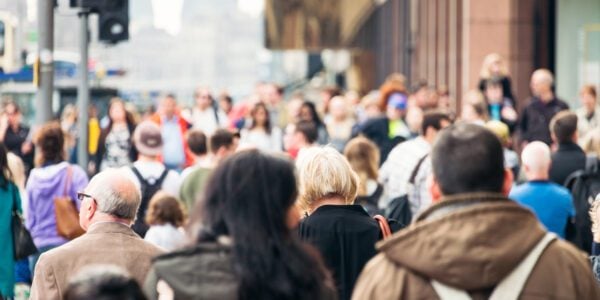The way we feel about our neighbours has largely improved since the start of the pandemic, find UCL researchers as part of the COVID-19 Social Study.
This upswing in neighbourly relations could indicate an increased sense of togetherness borne through a shared experience.
The largest improvements reported were for “support”: 35% of respondents in September 2021 said that neighbourhood support had improved (vs 28% in July 2020), whilst 15% say support had deteriorated (vs 5% in July 2020) compared with before the pandemic.
This was followed by an increased sense of “shared values”, with 32% of adults in September 2021 saying that these had improved compared to before the pandemic, whilst only 9% said this in July 2020.
Similarly, 1 in 4 (25%) report greater “trust” in people living in their neighbourhood and a greater sense of neighbourhood cohesion in 2021 compared to before the pandemic (vs 7% for trust and 9% for cohesion in July 2020).
For some, their experience of their neighbourhood relations has worsened. Over 1 in 5 (22%) reported a decrease in neighbourhood trust in September 2021, compared to only 4% who said this in July 2020. Similarly, nearly 1 in 5 (17%) said in September 2021 that they felt less cohesive, close, and had fewer shared values with their neighbours.
Launched in the week before the first lockdown started, the ongoing UCL COVID-19 Social Study is funded by the Nuffield Foundation with additional support from Wellcome and UK Research and Innovation (UKRI). It is the UK’s largest study into how adults are feeling about the lockdown, government advice and overall wellbeing and mental health with over 70,000 participants who have been followed across the last 80 weeks.
Lead author, Dr Elise Paul (UCL Institute of Epidemiology & Health) said: “Our report shows there have been positive improvements in the way we feel about our neighbours, when compared to before the pandemic.
“Interestingly, the longer the pandemic has gone on appears to have solidified this trend, with more people feeling greater levels of trust, shared values and cohesion with those who live closest to us.
“Perhaps this boost in neighbourly relations is no surprise. Many of us have spent significantly more time at home during the pandemic and it is likely we have spent more time with and got to know our neighbours far better than before. In addition, there is likely to be an empathy and togetherness borne through the shared experience of the past year and a half.
“That said, some people now experience worsening of neighbourhood relations. Much has changed over the last 18 months, with limits to our freedom, how we interact with others and changes to how we shop and travel. Perhaps these restrictions have caused some to feel less satisfied with life in their community.”
Food shortages
Worries about being able to access sufficient food have been increasing over the past two months (in line with current problems with food supply) and are now similar to what they were at the end of 2020, affecting around 1 in 8 (13%) people. Most groups are reporting similar concerns about accessing food, although these concerns are higher in people with a mental or physical health diagnosis and people with lower household incomes.
Whilst it is encouraging to see that the pandemic may have improved people’s relationships with their neighbours, this research also shows that the pandemic continues to negatively impact some people more than others. In the past few months, people have increasingly reported worries about food supply and finance, especially those on lower incomes. Without government action, these pressures are likely to increase further in coming months given fuel price rises, the reduction in Universal Credit and ongoing food supply issues.”Cheryl Lloyd, Education Programme Head at the Nuffield Foundation
COVID-MINDS Network
The study team is also running the COVID-MINDS Network: an international network of over 160 longitudinal mental health studies from over 70 countries. Through the network, dozens of scientists and clinicians are coming together internationally to collate results from mental health studies running in countries around the world and compare findings. The initiative is supporting the launch of new mental health studies in other countries, to research whether actions taken in specific countries are helping to protect mental health.























































